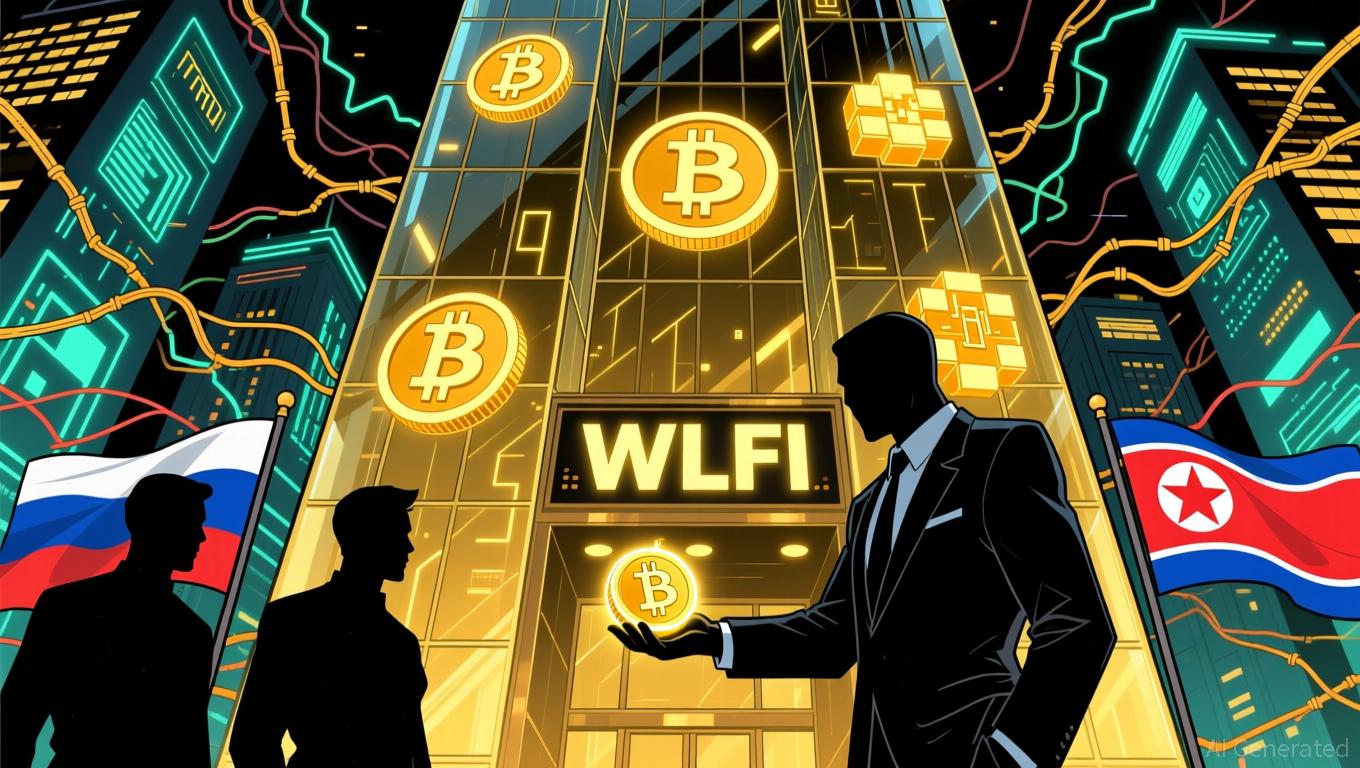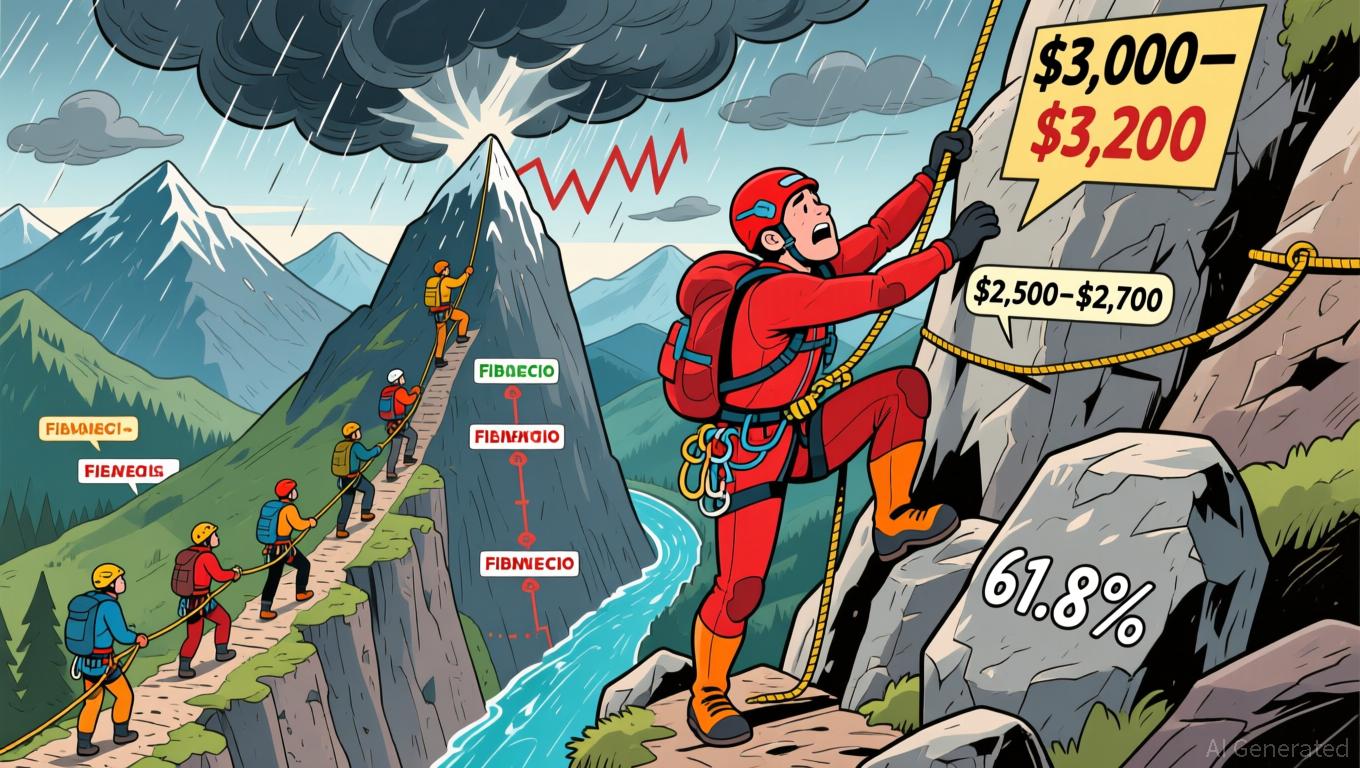Trump's cryptocurrency empire faces allegations of boosting political sway and posing security risks
- House Democrats accuse Trump's WLFI crypto firm of selling tokens to sanctioned entities like North Korea and Russia, calling it the "world's most corrupt crypto startup." - The firm's $1B in crypto profits and ties to the Trump brand raise national security concerns over political influence and illicit financial activity. - Eric Trump stepped back from WLFI operations in September amid regulatory scrutiny, highlighting conflicts of interest and insider trading risks. - The case underscores broader crypt
House Democrats Target Trump-Linked Crypto Firm Amid Corruption Allegations
Democratic members of the House have sharply criticized the Trump administration, labeling it as the "world's most corrupt crypto startup." This accusation stems from ongoing probes into the Trump family's involvement in cryptocurrency businesses. At the center of the controversy is WLFI, a company associated with the Trump family, which faces allegations of selling digital tokens to sanctioned organizations in North Korea and Russia.
These concerns were outlined in a letter sent in November by Democratic lawmakers, who urged U.S. Attorney General Pam Bondi to initiate a comprehensive investigation. The letter claims that the Trump family's cryptocurrency activities, which are believed to have earned around $1 billion in profits, could threaten national security and potentially allow political favors to be bought through privileged access to the president.

The situation escalated when Eric Trump, son of former President Donald Trump, reduced his direct involvement with WLFI in September to adhere to Nasdaq’s listing requirements. According to filings with the SEC, he shifted to a non-voting board observer position. This adjustment comes after months of heightened scrutiny from regulators and lawmakers, who have raised red flags about possible conflicts of interest and the risk of insider trading. The House Democrats' correspondence emphasizes fears that WLFI’s operations, given their Trump connections, could facilitate illegal financial transactions.
Broader Implications for Crypto Regulation
This case has reignited debates about the challenges regulators face in overseeing the cryptocurrency sector. While the SEC has recently approved Bitcoin futures and spot ETFs, critics maintain that insufficient regulation leaves the door open for misconduct. The Trump family's crypto dealings, now under congressional review, highlight the ongoing struggle to balance technological innovation with effective oversight. Industry experts suggest that the outcome of this investigation could shape future regulatory policies, especially as global markets seek to protect investors while encouraging progress.
As the inquiry continues, the political stakes remain high. Lawmakers’ demands for action reflect the increased examination of crypto-related enterprises in the wake of recent elections. Should Pam Bondi become involved, the case could also serve as a test of prosecutorial independence in politically sensitive investigations.
Disclaimer: The content of this article solely reflects the author's opinion and does not represent the platform in any capacity. This article is not intended to serve as a reference for making investment decisions.
You may also like
CME Suspension: Global Market Vulnerabilities Revealed by Thermodynamic Constraints
- CME Group halted Globex trading on Nov 28, 2025 due to CyrusOne cooling system failure in Chicago, freezing 90% of global derivatives markets. - The outage caused erratic price swings in gold/silver and disrupted EBS forex platforms, exposing vulnerabilities in third-party data center reliance. - Despite post-holiday timing softening immediate impact, the incident highlighted systemic risks from thermodynamic limits in AI-era infrastructure. - CME faces pressure to build redundant systems as it expands c

Turkmenistan's Approach to Cryptocurrency: Navigating Government Oversight and Public Confidence
- Turkmenistan will implement strict crypto regulations from 2026, requiring miner registration, exchange licensing, and anti-money laundering protocols under President Berdimuhamedov. - The framework mirrors Central Asian neighbors' approaches but prohibits anonymous transactions, national symbols in branding, and hidden mining operations. - While aligning with global crypto oversight trends, the law maintains state control over digital assets, raising questions about market viability amid Turkmenistan's

Ethereum Updates Today: Institutional Optimism Meets Technical Challenges: The Pivotal Moment for Crypto
- Ethereum and XRP face critical technical junctures on Nov 28, 2025, with ETH testing $2,500–$3,200 support and XRP hovering near $2.30 amid mixed signals. - Bitcoin's bearish trend (50-day EMA at $100,937) contrasts with JPMorgan's "tradable macro asset" designation, potentially attracting institutional capital. - Solana's BONK memecoin launches a physically-backed ETP on SIX Swiss Exchange, bridging meme coins and traditional markets amid SOL's $140 support risks. - Market dynamics highlight institution

How a Query from an Office Supplies Specialist Transformed a $12 Billion Trucking Approach
- A non-trucking board member's question prompted Ryder System to shift focus from leasing to targeting 80-85% of companies owning their own trucks. - The strategic pivot aligns with growing demand in long-haul freight driven by e-commerce, trade agreements, and tech innovations like IoT fleet management. - Industry consolidation and sustainability trends, including electric trucks, are reshaping competition as firms expand specialized services like temperature-controlled logistics. - Ryder's experience hi
